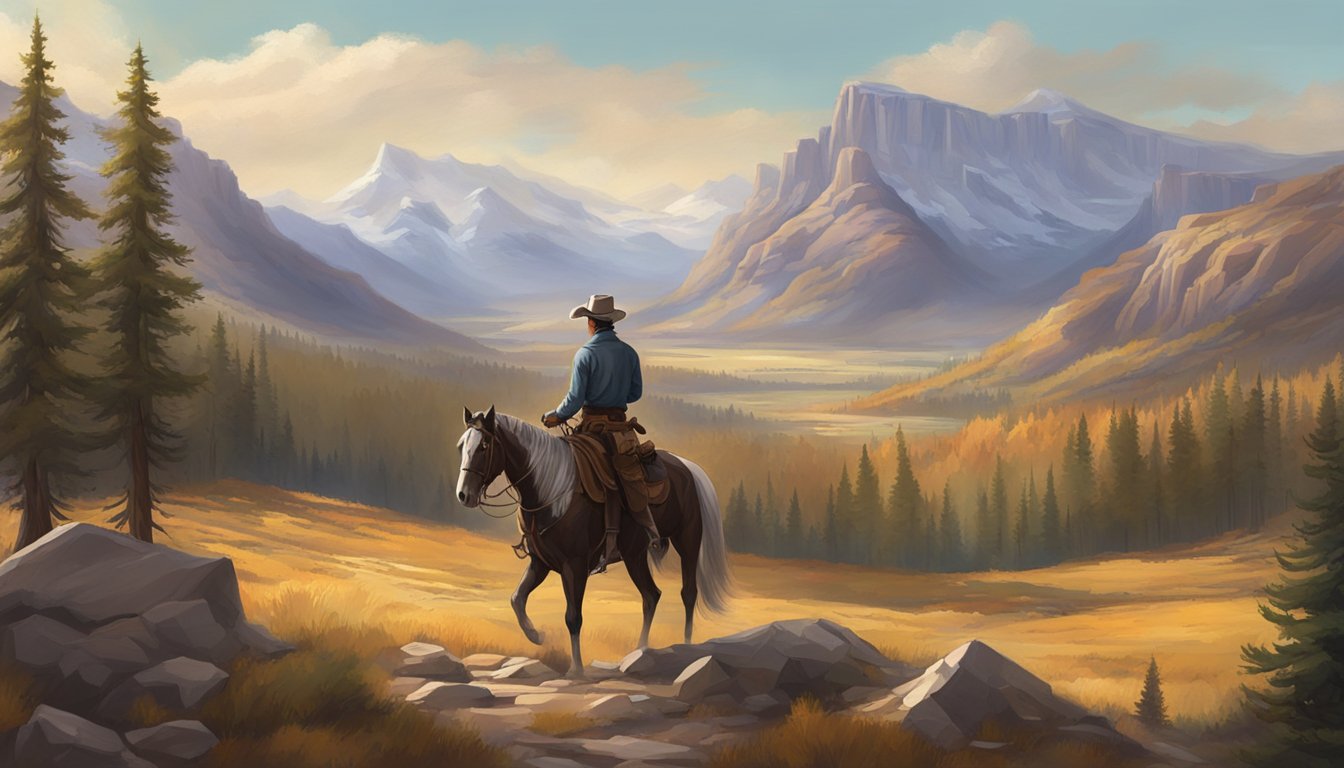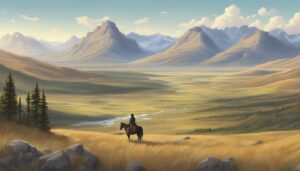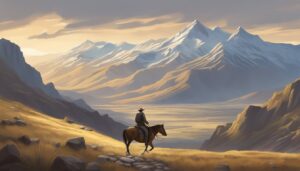Western films and TV series have captivated audiences for decades with their rugged landscapes and complex characters. Two iconic figures that stand out are John Dutton from “Yellowstone” and Little Bill Daggett from “Unforgiven.” Both characters embody the grit and determination associated with the Western genre, but in vastly different ways.
John Dutton, portrayed by Kevin Costner, is the patriarch of a powerful ranching family in Montana. He fiercely protects his land and legacy, often resorting to morally ambiguous methods. Little Bill Daggett, played by Gene Hackman in “Unforgiven,” is a tough sheriff in Wyoming who rules Big Whiskey with an iron fist. While both characters are impressive in their own right, John Dutton’s modern-day struggles and complex family dynamics make him a more relatable and nuanced Western hero for contemporary audiences.
The comparison between these two characters offers insights into the evolution of the Western genre. Dutton represents the challenges faced by ranchers in the present day, while Daggett embodies the classic Old West lawman archetype. Their contrasting approaches to justice and power highlight the changing face of the American frontier, both real and fictional.
Historical Context of Western Genre

The Western genre has undergone significant evolution since its inception, shaping iconic figures and storytelling techniques. Its development reflects changing societal values and cinematic trends over the decades.
Evolution of Westerns
Westerns emerged in the early 20th century, drawing inspiration from America’s frontier era. Silent films like “The Great Train Robbery” (1903) set the stage for the genre’s visual style. John Ford’s “Stagecoach” (1939) elevated Westerns to artistic prominence, introducing complex characters and stunning landscapes.
The 1950s and 1960s saw the genre’s golden age, with classics like “The Searchers” and “The Good, the Bad and the Ugly.” These films often explored themes of justice, morality, and the clash between civilization and wilderness.
In the 1970s, revisionist Westerns like “The Wild Bunch” challenged traditional narratives, portraying a grittier, more morally ambiguous Wild West.
Iconic Western Figures
John Wayne epitomized the classic Western hero, embodying rugged individualism and moral certainty in films like “The Alamo” and “True Grit.”
Clint Eastwood redefined the Western antihero, portraying complex characters in Sergio Leone’s “Dollars Trilogy” and later directing acclaimed Westerns like “Unforgiven.”
Directors such as John Ford and Sam Peckinpah shaped the genre’s visual language and themes. Ford’s sweeping vistas of Monument Valley became synonymous with the Western landscape.
Other notable figures include Gary Cooper, James Stewart, and more recently, Kevin Costner, who have all left indelible marks on the genre.
Profiles of the Principals

John Dutton and Little Bill Daggett are complex characters who dominate their respective Western narratives. Both men wield significant power and influence within their communities, though their methods and motivations differ greatly.
John Dutton of Yellowstone
John Dutton, portrayed by Kevin Costner, is the patriarch of the Dutton family and owner of the largest contiguous ranch in the United States. He’s a shrewd businessman and rancher who fiercely protects his land and legacy.
Dutton’s character is defined by his unwavering commitment to preserving his family’s ranch. He often employs morally ambiguous tactics to achieve his goals, blurring the line between right and wrong.
As a father, John is stern but loving. His relationships with his children are complicated, reflecting the harsh realities of ranch life and the weight of family expectations.
Little Bill Daggett from Unforgiven
Little Bill Daggett, played by Gene Hackman, is the ruthless sheriff of Big Whiskey, Wyoming. He’s a former gunfighter turned lawman who rules the town with an iron fist.
Daggett prides himself on maintaining order through intimidation and violence. His methods are brutal, often crossing ethical boundaries in the name of keeping the peace.
Unlike John Dutton, Little Bill has no family ties. His sole focus is on enforcing his version of justice, which frequently involves violent confrontations with those who challenge his authority.
Daggett’s character serves as a foil to the film’s protagonist, highlighting the moral complexities of the Old West.
Analyzing Key Themes

John Dutton and Little Bill Daggett embody complex Western heroes shaped by their harsh environments. Their stories explore crucial themes that define the genre and captivate audiences.
Law, Order, and Justice
John Dutton and Little Bill Daggett approach law and justice from different angles. Dutton, as a rancher and politician, often bends rules to protect his land and legacy. He operates in legal gray areas, using wealth and influence to maintain control.
Little Bill, as a sheriff, represents official law enforcement. However, his brutal methods and personal agenda often overshadow true justice. He enforces his own moral code, sometimes at odds with legal statutes.
Both characters highlight the complex relationship between law and justice in frontier settings. They demonstrate how personal interpretations of right and wrong can shape the application of authority in lawless territories.
Revenge and Redemption
Revenge drives key plot elements for both Dutton and Daggett. John Dutton seeks retribution against those threatening his ranch and family. His actions often blur the line between justified protection and vengeful violence.
Little Bill’s past as a violent gunslinger haunts him. He attempts to redeem himself through his role as sheriff, but often falls back on old, violent habits. His pursuit of outlaws becomes a personal vendetta, mixing revenge with misguided attempts at redemption.
These characters showcase how the desire for payback can consume and corrupt. Their journeys illustrate the fine line between justice and vengeance in the unforgiving Western landscape.
Survival and Grit
The harsh frontier environment tests both Dutton and Daggett’s resilience. John Dutton’s grit manifests in his relentless fight to preserve his ranch against modern threats. He embodies the survivor mentality, adapting to changing times while clinging to traditional values.
Little Bill’s survival instincts stem from his violent past. His tough exterior and ruthless tactics reflect a life shaped by frontier brutality. He sees strength as the key to survival, often resorting to intimidation and force.
Both characters demonstrate the physical and mental toughness required to thrive in unforgiving landscapes. Their grit is a testament to the resilience demanded by the American frontier, showcasing how survival often comes at a moral cost.
Setting Comparison: Montana Vs Big Whiskey

The settings of Yellowstone and Unforgiven contrast the vast, open landscapes of Montana with the frontier town of Big Whiskey, Wyoming. Both locations embody the rugged spirit of the American West but differ in scale and atmosphere.
Montana: Yellowstone Ranch
Yellowstone Ranch spans a massive 500,000 acres in Montana’s Paradise Valley. The property features breathtaking mountain vistas, rolling grasslands, and pristine rivers. John Dutton’s ranch headquarters include a grand log mansion and working cattle facilities.
The ranch reflects Montana’s natural beauty and agricultural heritage. It serves as a stronghold for the Dutton family’s power and influence in the region. The vast open spaces of the ranch provide a sense of freedom and isolation from the outside world.
Wyoming: Town of Big Whiskey
Big Whiskey is a small, dusty frontier town in 1880s Wyoming. The settlement consists of a main street lined with wooden buildings, including a saloon, general store, and sheriff’s office. Muddy streets and hitching posts for horses are common sights.
The town represents a typical Western outpost of the era. It’s a place where law and order are tenuous, enforced by the iron fist of Sheriff Little Bill Daggett. Big Whiskey’s confined setting creates an atmosphere of tension and claustrophobia, contrasting sharply with Yellowstone’s expansive terrain.
Character Development and Dynamics

John Dutton and Bill Daggett showcase contrasting approaches to leadership and justice in their respective Western settings. Their complex personalities and evolving character arcs drive the narratives of Yellowstone and Unforgiven.
Complexity of John Dutton
John Dutton, portrayed by Kevin Costner in Yellowstone, embodies a multifaceted character. As the patriarch of the Dutton family, he fiercely defends his ranch while grappling with moral dilemmas.
Taylor Sheridan’s creation reveals layers of Dutton’s personality throughout the series. Initially focused solely on preserving his legacy, John faces challenges that force him to reassess his priorities.
His relationships with his children, particularly Beth, expose his vulnerabilities and depth. John’s actions often blur the line between right and wrong, positioning him as an anti-hero in the modern Western landscape.
Bill Daggett’s Approach to Law
Little Bill Daggett, the antagonist in Unforgiven, presents a different take on Western authority figures. As the sheriff of Big Whiskey, he enforces his own brand of frontier justice.
Daggett’s character development revolves around his rigid adherence to law and order, often at the expense of true justice. His methods become increasingly brutal as he confronts threats to his authority.
Unlike John Dutton, Daggett’s arc doesn’t show significant growth or self-reflection. His unwavering stance and brutal tactics paint him as a more traditional Western villain, lacking the nuanced complexity of Yellowstone’s protagonist.
Narrative Analysis

Yellowstone and Unforgiven employ distinct storytelling approaches to develop their central characters. Their narrative structures reveal key differences in pacing, character arcs, and thematic exploration.
Yellowstone’s Story Arcs
Yellowstone unfolds over multiple seasons, allowing for expansive character development. John Dutton’s journey spans numerous episodes, revealing layers of his personality and motivations. The show interweaves multiple plotlines, creating a complex web of relationships and conflicts.
Season 4 intensifies the stakes for the Dutton family. It explores John’s struggle to protect his ranch and legacy while facing external threats and internal family dynamics. The extended format enables deep dives into supporting characters, enriching the overall narrative.
Yellowstone’s story arcs often involve power struggles, family loyalty, and the clash between tradition and progress. These themes are woven throughout the series, creating a rich tapestry of interconnected storylines.
Unforgiven’s Plot Structure
Unforgiven adopts a more condensed narrative approach. The film focuses on a single, tightly-woven story arc centered around William Munny’s reluctant return to violence. Little Bill Daggett serves as the primary antagonist, driving the plot forward through his brutal methods of maintaining order.
The movie’s plot structure is linear and follows a classic Western revenge tale. It builds tension gradually, leading to a climactic confrontation between Munny and Daggett. This focused approach allows for intense character study within a limited timeframe.
Unforgiven’s narrative emphasizes themes of redemption, the nature of violence, and the deconstruction of Western heroism. The plot efficiently explores these ideas through carefully crafted scenes and dialogues, making every moment count in the character development of both Munny and Daggett.
The Code of the West: Morals and Ethics

The Code of the West shaped the moral landscape of the American frontier. It influenced the characters and actions in both “Yellowstone” and “Unforgiven,” albeit in contrasting ways.
Yellowstone’s Moral Compass
John Dutton embodies aspects of the Code of the West in “Yellowstone.” He values loyalty, family, and protecting his land. Dutton’s adherence to tradition and his own moral code often puts him at odds with modern society.
He upholds principles like keeping one’s word and defending what’s rightfully his. These traits align with the unwritten rules of the Old West. However, Dutton’s methods sometimes blur ethical lines.
His actions, while rooted in preserving his legacy, can be ruthless. This creates a complex moral character, reflecting the harsh realities of maintaining power in the modern West.
Unforgiven’s Ethical Dilemmas
Little Bill Daggett in “Unforgiven” presents a darker take on frontier justice. As the town sheriff, he claims to uphold the law. Yet his actions often contradict the Code of the West’s principles of fair play and respect.
Daggett’s brutal methods and selective application of justice reveal a corrupted moral compass. He uses violence to maintain order, justifying it as necessary for the greater good.
This approach challenges the romanticized notions of Western ethics. It portrays a world where morality is flexible and power often trumps justice. Daggett’s character serves as a critique of the idealized Code of the West, showing its potential for misuse.
Impact on Popular Culture

John Dutton and Little Bill Daggett have left indelible marks on Western cinema and television. Their characters have shaped audience perceptions and influenced subsequent portrayals of law and order in the American frontier.
Cinematic Influence
John Dutton’s character in Yellowstone has revitalized interest in modern Westerns. The show’s popularity has sparked a resurgence of neo-Western dramas on television and streaming platforms.
Kevin Costner’s portrayal has set a new standard for complex patriarchal figures in the genre. Dutton’s blend of traditional values and modern conflicts resonates with viewers, inspiring similar character archetypes in other productions.
Little Bill Daggett, portrayed by Gene Hackman in Unforgiven, redefined the Western lawman. His morally ambiguous character challenged conventional hero-villain dynamics in Westerns.
Daggett’s impact is evident in the nuanced antagonists that followed in both film and television. His character paved the way for more realistic depictions of frontier justice and corruption.
Reception and Awards
Unforgiven received critical acclaim and numerous accolades, including four Academy Awards. Gene Hackman’s performance as Little Bill Daggett earned him an Oscar for Best Supporting Actor.
The film’s success solidified its place in cinematic history and influenced future Western productions. Unforgiven is often cited as a pivotal work in the revival of the Western genre in the 1990s.
Yellowstone, while not an awards darling, has achieved massive popular success. The show consistently draws high viewership ratings and has spawned multiple spin-offs.
Its cultural impact extends beyond television, influencing fashion trends and boosting tourism in filming locations. The series has reignited public interest in ranch life and modern cowboy culture.
Supporting Cast and Character Roles

Both Yellowstone and Unforgiven feature rich supporting casts that enhance the depth and complexity of their respective narratives. These characters play crucial roles in shaping the protagonists’ journeys and the overall story arcs.
Yellowstone’s Ensemble
Beth Dutton, John’s fierce and intelligent daughter, stands out as a formidable force in Yellowstone. Her sharp wit and ruthless tactics make her a key player in the family’s struggles. Rip Wheeler, the loyal ranch hand and Beth’s love interest, brings a rugged intensity to the series.
Jamie Dutton, John’s adopted son, adds layers of conflict and betrayal to the family dynamic. His complex relationship with the Duttons drives many of the show’s pivotal plot points. The series also explores the tensions between the Dutton ranch and indigenous people, particularly through characters like Monica Dutton and Thomas Rainwater.
Unforgiven’s Supporting Characters
Ned Logan, played by Morgan Freeman, serves as William Munny’s longtime friend and partner. His presence adds depth to Munny’s character and helps ground the narrative in a shared history of violence and redemption.
English Bob, a flamboyant British gunslinger, provides a stark contrast to the gritty realism of the American West. His interactions with Little Bill Daggett highlight the sheriff’s brutality and complex nature.
The Schofield Kid, a young aspiring gunslinger, represents the allure and ultimate disillusionment with the romanticized notion of the Old West. His journey parallels Munny’s own struggle with his violent past.
Representation of Law in the Wild West

Law enforcement in the Wild West often fell to individual sheriffs and lawmen who wielded significant power. Their methods and motivations varied greatly, as depicted in works like Yellowstone and Unforgiven.
Law in Yellowstone
In Yellowstone, law takes on a complex form through John Dutton’s character. As a powerful rancher, Dutton often operates in legal gray areas to protect his land and legacy.
He maintains connections with local law enforcement and politicians, blurring the lines between official authority and personal influence. This portrayal reflects the real-life power dynamics of wealthy landowners in the Old West.
Dutton’s approach to justice is swift and often extrajudicial. He relies on loyalty, intimidation, and at times violence to uphold his version of order. This echoes historical accounts of frontier justice, where powerful individuals sometimes acted as judge, jury, and executioner.
Law in Unforgiven
Unforgiven presents a darker view of law enforcement through Sheriff Little Bill Daggett. As the primary lawman in Big Whiskey, Wyoming, Daggett rules with an iron fist.
His brutal methods, including severe beatings and public humiliation, showcase the unchecked power some sheriffs wielded in isolated frontier towns. Daggett’s character highlights the thin line between peacekeeper and tyrant in the Wild West.
The film explores the concept of bounties and hired guns, common elements of frontier law. It portrays a world where justice is often bought and sold, with Daggett attempting to maintain control by regulating who can carry weapons in his town.
Conclusion: Defining the Western Hero

Western heroes captivate audiences with their complex moral codes and rugged individualism. John Dutton and Little Bill Daggett represent two distinct archetypes within this tradition.
Dutton embodies the modern Western hero, balancing family legacy with evolving societal norms. His character in Yellowstone showcases the genre’s ability to adapt to contemporary themes.
Daggett, from Unforgiven, presents a more traditional yet morally ambiguous lawman figure. His actions challenge viewers to reconsider the nature of justice in the Wild West.
Both characters demonstrate key traits of Western heroes:
- Unwavering determination
- Complex moral frameworks
- Willingness to use violence when deemed necessary
The enduring appeal of these figures lies in their grit, resilience, and ability to navigate harsh frontier environments. They offer audiences a glimpse into a romanticized yet brutal era of American history.
Ultimately, the Western hero archetype continues to evolve, reflecting changing societal values while maintaining core elements that have defined the genre for generations.



